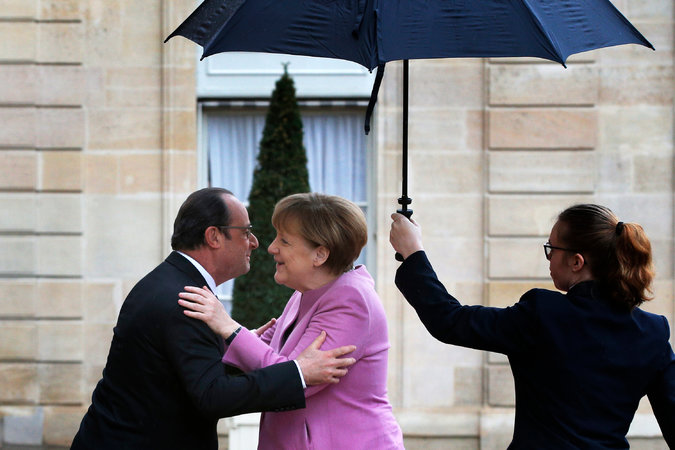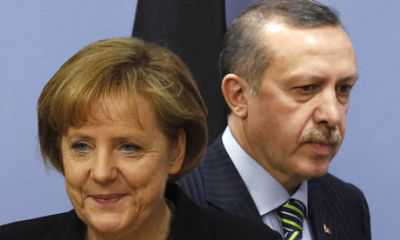It is bad enough that Turkish President Erdogan wants to sue a German comic for insulting him! It is much more outrageous for German Chancellor Angela Merkel allowing the lawsuit to go forward, based on a 19th century law!
Under this archaic law, anyone who offends a foreign leader can be sued in court after obtaining the consent of the German government. Erdogan now joins the dictatorial ranks of Shah Mohammad Reza Pahlavi of Iran and Chilean leader Augusto Pinochet who had filed similar lawsuits in Germany.
Merkel, after initially defending the German citizen’s right to freedom of press and opinion, contrary to Turkey’s repressive laws, shamefully buckled under Erdogan’s threat to flood Europe with Syrian refugees, after accepting several billion dollars to block such migrants!
Merkel, Obama, and others don’t seem to understand that appeasing a bully only leads to more bullying. The best way to stop a bully is just to say ‘no!’ Naturally, Erdogan will throw a temper tantrum like a spoiled brat, make threats, and probably withdraw his ambassador! But, after a while, he will learn that he can’t impose his will outside of Turkey, and that the rest of the world will not meekly kowtow to his Sultanic diktats!
For several decades, American, British and Israeli leaders have made the same humiliating mistake of buckling under threats from Erdogan and his predecessors not to utter the words “Armenian Genocide.” Had these foreign leaders just said no on day one, they would have spared themselves years of escalating threats! Unfortunate, they have allowed the tail to wag the dog!
Merkel, has now gone down the slippery slope of appeasing the Turkish bully. She has made the gross misjudgment that by allowing the prosecution of the German satirist, she has bought Erdogan’s friendship! The German Chancellor will soon face new demands from the Turkish President on Syrian refugees and many other issues, such as next month’s scheduled vote in the Bundestag on the Armenian Genocide which has already been postponed several times under earlier Turkish threats.
Merkel’s unwise and undemocratic move may cause a split in her “grand coalition” government. Thomas Oppermann, the parliamentary leader of the center-left Social Democrats, criticized her decision, urging the Chancellor to repeal the antiquated law. Foreign heads of state should not enjoy special rights to sue German citizens, Oppermann warned.
Two influential ministers in Merkel’s government also announced their opposition to her decision. Foreign Minister Frank-Walter Steinmeier and Justice Minister Heiko Maas declared: “The freedom of opinion, media and culture are the highest treasures of our Constitution.”
Furthermore, two-thirds of the German public opposes Merkel’s decision to try the satirist, according to a recent survey. In the last few days, her popularity fell from 56% to 45%. According to another survey, 66% of the respondents oppose the prosecution of the satirist, while only 22% support it. The German newspaper ZDF, which posted the satirist’s video on Erdogan, has promised its full legal support during the investigation.
European Commission President Jean-Claude Juncker also criticized Erdogan’s unacceptable overreaction. Juncker vowed not to compromise on European values in order to preserve the recently struck deal with Ankara to stem migrant flows, according to the Turkish Hurriyet newspaper. “I cannot understand at all that a German ambassador has been summoned for an admittedly difficult satirical song,” Juncker stated on April 13. “That does not bring Turkey closer to us. It will put us farther away from each other.”
According to the New York Times, Erdogan has filed almost 2,000 lawsuits in Turkey against those he accuses of insulting him. The Turkish President has already brought a private lawsuit in a German court against the satirist, who could face a three-year jail term or an unspecified fine, if found guilty.
Satirist Jan Bohmermann, in his sarcastic poem, made references to sex with goats and oppressing minorities. He called Erdogan “dumb as a post, cowardly and uptight” and “perverse, lice-ridden… kicking Kurds, beating Christians, all the while watching child porno films.”
No matter how insulting the poem may be, the writer should have the right to express his opinion freely. It is one thing for Erdogan, the dictatorial leader of a third world country, to repress the media. It is completely a different matter for the head of a major Western European democracy to side with the Sultan of a fascist Middle Eastern state. In this regard, Merkel’s transgression is much worse than Erdogan’s!







